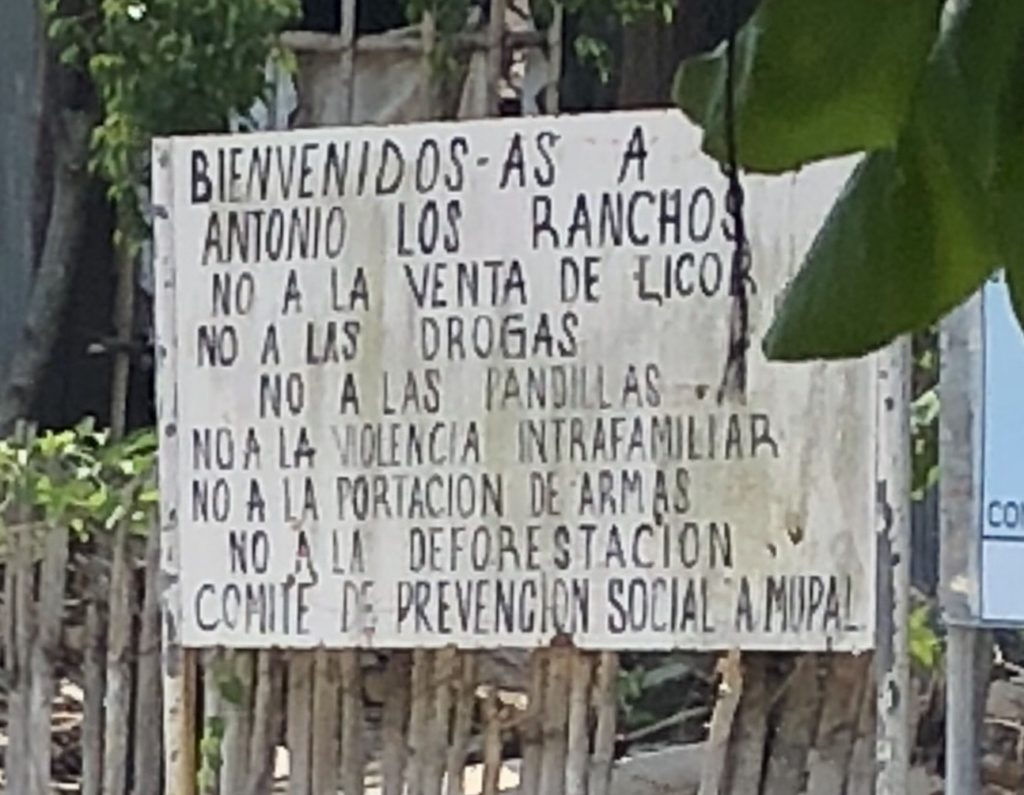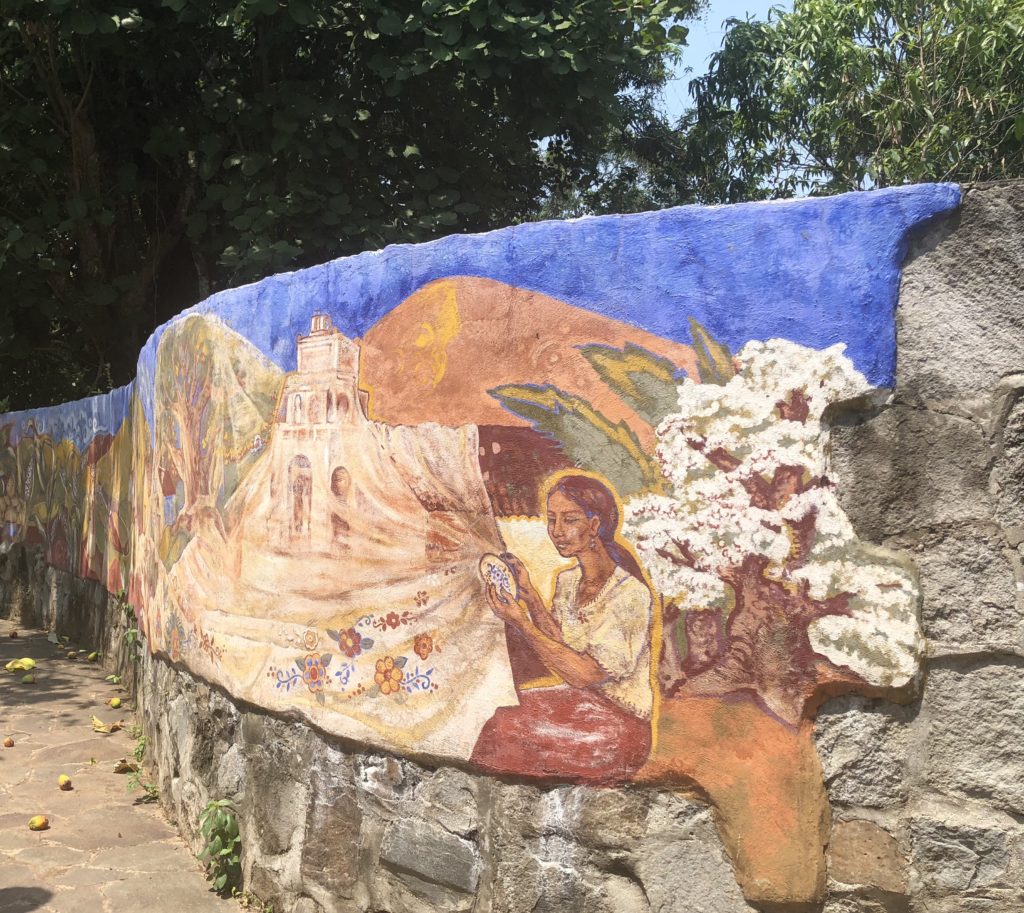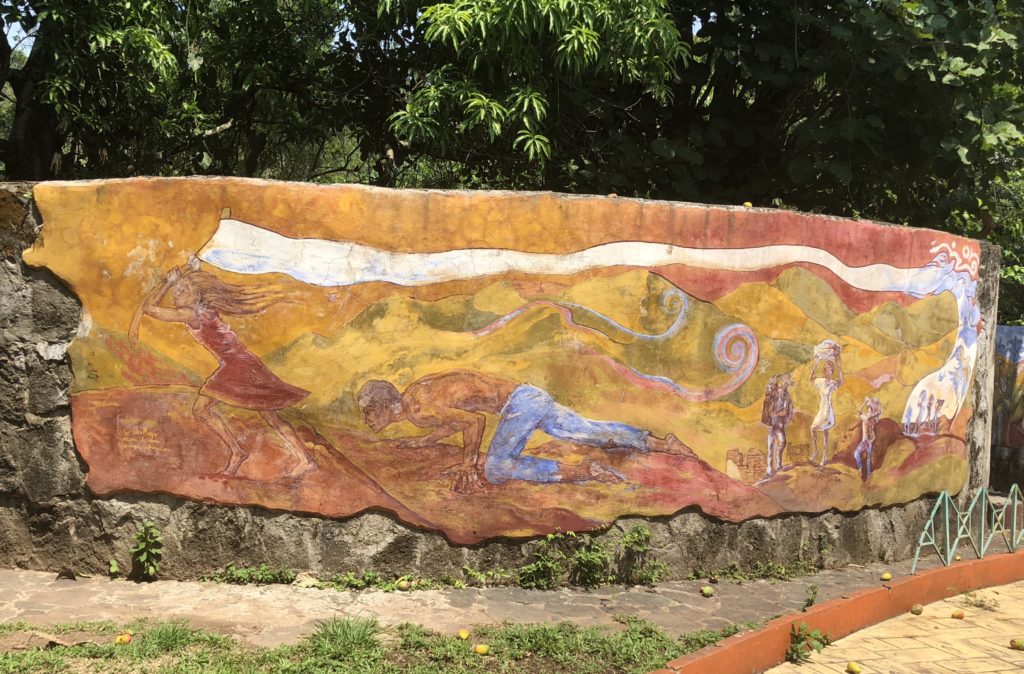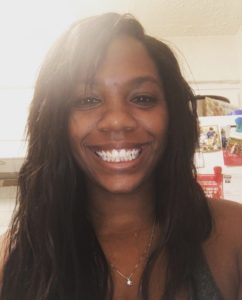Central America Travel Seminar: “Power is for the people”

BY JILLIAN LINCOLN
Buenas Días!
What a beautiful day driving through the green countryside up the mountains of El Salvador on the way to Chalatenango to visit the memorial site of the Maryknoll sisters. We had a stop by the mayor’s office where we learned that the town San Antonio Los Ranchos has 100 percent literacy. The people in the town are highly conscientious. There are clean streets, and garbage and recycling cans along fences on the streets. The people of the town participate in their own government and laws. They took the time to write out the rules of the town. Things such as no selling of liquor or drugs, and no violence or deforestation that will prevent the social order.

The town was originally vacated during the wars. People who were displaced were eventually moved back to the town. Only a small percentage of residents that occupy San Antonio Los Ranchos are originally from there. The people before resettling were sent to refugee camps in Mesa Grande in Honduras. There, members of the Catholic faith took care of the people and helped them to organize. It is one of the reasons why the town today is incredibly organized. The town has even begun preparation for a library. Public libraries are not common in El Salvador. There aren’t places to borrow public books. The slogan of the town is “El Poder Esta En La Gente” — Power is for the people.
We continued to walk through this prevailing town to the public park. In the park is a library that the public can have access to. It’s only one of two libraries that the public can come and borrow books. It also contains a lot of books for children to enjoy. The park also contains pictures of men and women who died in the war and murals talking about the people fleeing from El Salvador and their return to San Antonio Los Ranchos. The murals painted on the stone wall begin with Hermosa Carla weaving a shawl over the people and having their dreams come true to return to their country and create a socially conscious community. Hermosa Carla was a nun trying to reunite some people who had just been released from prison to their families. As they were driving, a flash flood overcame the car. Everyone safely got out of the car but Hermosa Carla did not survive. There is a white stone memorial next to the river where she died.

 As the afternoon wound down we had the privilege to hear two stories, one from native Salvadorian Anna Silvia, and one from American Jeanne Rikkers who immigrated and works in El Salvador. Silvia was born to a family of three children. Her father died when she was only four-years-old. Her mother and her siblings went to live in the home of her maternal grandmother. There she began going to an evangelical church with one of her aunts. The rest of Silvia’s family went to Catholic church. Her mother told her she had to start attending Catholic church with the rest of the family. Silvia at the age of eight or nine negotiated with her mother that she must go through her first communion. Once that was completed she could decide what church she wants to go through. Which do you think she chose? Yes! The one she had been going to with her aunt.
As the afternoon wound down we had the privilege to hear two stories, one from native Salvadorian Anna Silvia, and one from American Jeanne Rikkers who immigrated and works in El Salvador. Silvia was born to a family of three children. Her father died when she was only four-years-old. Her mother and her siblings went to live in the home of her maternal grandmother. There she began going to an evangelical church with one of her aunts. The rest of Silvia’s family went to Catholic church. Her mother told her she had to start attending Catholic church with the rest of the family. Silvia at the age of eight or nine negotiated with her mother that she must go through her first communion. Once that was completed she could decide what church she wants to go through. Which do you think she chose? Yes! The one she had been going to with her aunt.
Silvia at the age of 12 was asked to take care of the preschool children at church. She continues to have faith but questioned God at the loss of her youngest child. It wasn’t until she went to a Pentecostal church and met a prophetess that she received the answers she was looking for. Silva and her family had to flee from El Salvador and received political asylum in Mexico. She said it was all these things that brought her to her work with many other women in creating an inclusive community that serves and loves people regardless if they know the Lord or not.
Our last speaker, Jeanne Rikkers, is the program director of research and learning. She spoke to us on the situation and history of the gangs in El Salvador. There are 60,000 people affiliated with one of the two gangs in El Salvador. The gangs came after the signing of the Peace Accords in 1992. There wasn’t much in the way of transitional justice or proper civilian-run police. So when Salvadorians were deported from the United States back to El Salvador, they brought their gang affiliations with them. It was in the gangs of Los Angeles where the youth found purpose in power where they couldn’t find it in their home country.
One of the solutions that the government came up with to solve the problems of the gangs was to throw them in jail. Jeanne and some of her colleagues did not believe this was the answer. They began to dig into how the gangs came to be and why people began joining them. They did believe that as clergy it was their responsibility to not only fight for their human rights but to be able to help integrate them back into society once they leave prison. As the group representing Union, one of our commissions is to understand the language of human rights not only in our country but others so that we can speak to the laws and are able to provide the support individuals need.
No trabajaremos en la promoción de la justicía sin que paquemos un precio. (Part of a quote on the crypt where the 6 Jesuit priests who were murdered are now buried.)
We won’t work in the promotion of justice without paying a price.
Jillian Lincoln is a Master of Divinity / Master of Christian Education student at Union.









